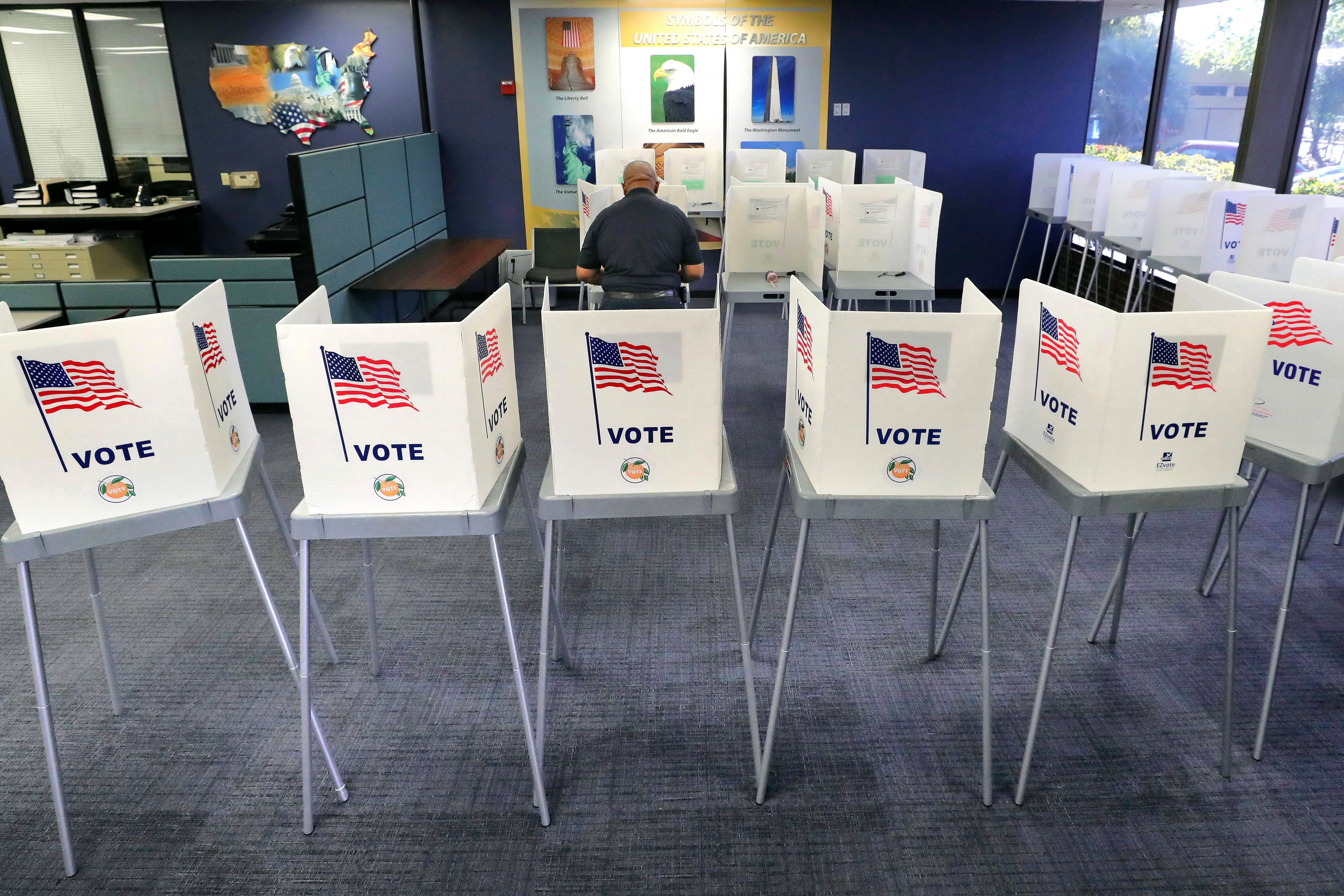Surge in new GOP voters puts pressure on Florida Democrats
Republicans in Florida are narrowing the voter registration gap with Democrats, underscoring the state's status as a crucial battleground in November

Your support helps us to tell the story
From reproductive rights to climate change to Big Tech, The Independent is on the ground when the story is developing. Whether it's investigating the financials of Elon Musk's pro-Trump PAC or producing our latest documentary, 'The A Word', which shines a light on the American women fighting for reproductive rights, we know how important it is to parse out the facts from the messaging.
At such a critical moment in US history, we need reporters on the ground. Your donation allows us to keep sending journalists to speak to both sides of the story.
The Independent is trusted by Americans across the entire political spectrum. And unlike many other quality news outlets, we choose not to lock Americans out of our reporting and analysis with paywalls. We believe quality journalism should be available to everyone, paid for by those who can afford it.
Your support makes all the difference.
Democrats have outnumbered Republicans in the crucial battleground of Florida for years, but have had little to show for it — walking away from the election box mostly empty-handed after failing to capitalize on their sizeable voter registration advantage.
Republicans have significantly cut into that lead in recent months, putting even more pressure on Democrats to turn out the vote in November — an uncertain proposition amid the coronavirus outbreak and for a political party that has long been on the losing side of razor-close, high-profile contests in the country's largest swing state.
The Republican surge in new voter registrations is especially worrisome among Democrats hoping to thwart President Donald Trump s bid for a second term and who bemoan their party's inconsistent outreach to Hispanic voters and lackluster efforts to further expand its base.
“We’ve always had that registration advantage, and I think it’s definitely concerning what the Republicans have done,” said state Sen. Annette Taddeo. “I do believe that the Democrats really need to invest year after year on ground operations, and they just haven’t done that."
A registration cushion is especially important for Democrats because of their lower propensity in casting ballots. Republicans continue to win, even if they have fewer voters, because they have been far more successful in turning out their ranks.
When Barack Obama won the state in 2008, he beat Republican Sen. John McCain by fewer than 205,000 votes in Florida — a far narrower gap than the nearly 700,000 voter-registration advantage Democrats had over Republicans at the time.
That advantage has dwindled over the years, as Republicans rebounded and the number of nonaffiliated voters rose from 2.1 million in 2008 to almost 3.7 million today.
Four years ago, when Trump prevailed over Hillary Clinton by a percentage point, Democrats had a 330,000 voter-registration advantage over Republicans. As of August, Republicans have cut that lead almost in half and could further narrow the gap before Monday’s voter registration deadline.
“Enthusiasm is at an all-time high for the president and his agenda,” said Susie Wiles, who is leading the charge for Trump in Florida, as she did four years ago.
“As the campaign goes door-to-door and talks to real people on the ground in Florida," she said, "we find it easy to register people as Republicans in this state.”
Wiles voiced bewilderment that Democrats — who chose to conduct their ground game through phone banks, social media and mailers — have not challenged Republicans out in the field.
“They didn’t show up, and that is what explains our voter registration numbers,” Wiles said.
In recent months, there have been growing concerns among rank-and-file Democrats whether Florida was a priority for the Biden campaign, as the campaign focused on winning back Pennsylvania, Michigan and Wisconsin for Democrats. Without Florida, Trump's path to a second term becomes exceedingly narrow.
As the campaign ramped up this year, Democrats had beefed up party staffing for an all-out blitz to register more voters and drive out the vote. But the coronavirus outbreak scuttled the party’s voter registration drive, sidelining the operation into the virtual realm.
A voter registration drive launched by 2018 gubernatorial candidate Andrew Gillum — who came within 32,400 votes of being the first Democrat to occupy the governor’s mansion in nearly two decades — fizzled after his political standing imploded because of troubles in his personal life.
With just days to go before Monday’s voter registration deadline, both parties are making a final push to grow their voter rolls.
Democrats are being aided by surrogates, including unions and voter advocacy groups that target communities of color. Billionaire Mike Bloomberg, who failed in his bid for the Democratic nomination, is bankrolling last-minute efforts in Florida to reach more voters for Biden.
During a call with reporters earlier this week, Biden’s Florida campaign director, Jackie Lee, called the Republican surge “smoke and mirrors.”
“The reality is that Democrats have out-registered Republicans on the whole for this entire cycle and we’re still up,” she said.
The state Democratic Party also argues that its focus on mail-in ballots is far more important because absentee voters are more likely to cast their ballots.
“Not only do we still have the voter registration advantage, we now have a vote by mail advantage," said Terrie Rizzo, the chair of the Florida Democratic Party, “and we’ve already seen remarkable Democratic return rates.”
But relying on an advantage in mail voting is risky in a year where norms are being upended by the pandemic, according to Dan Smith, a data guru who chairs the Political Science Department at the University of Florida.
“Voting by mail is a completely different process, one that is alien to many voters. To think that merely requesting a ballot means you're going to vote is very risky.”
___
Follow Bobby Caina Calvan on Twitter at https://twitter.com/BobbyCalvan